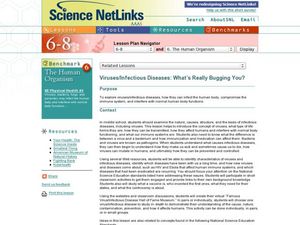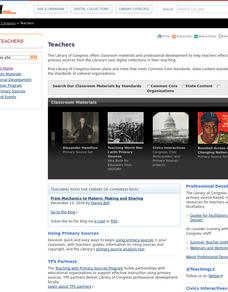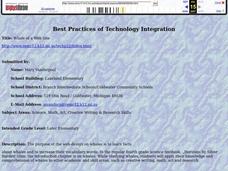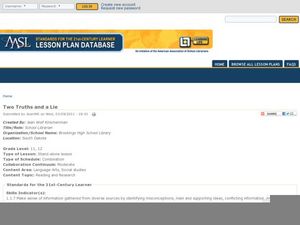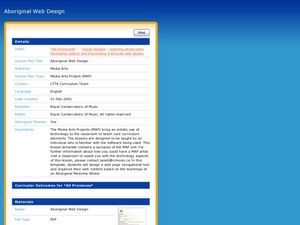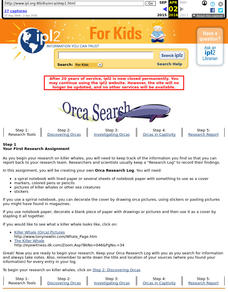Curated OER
Career: Fashion Designer Reports
Have your students study selected fashion designers. In pairs, they review the designers and fashion capitols on Websites provided by the teacher and then present oral reports. Using a research worksheet, students assemble their findings...
Curated OER
The Price is Right
Students, through various activities, explore online databases. Using the internet, students explore the distributors websites. They collect specific information on selected products. An spreadsheet with price comparisons is developed....
Curated OER
Mammals of the Deep Blue
Third graders study ocean mammals. They explore various websites and databases to answer questions and record answers about whales and dolphins. Finally they use the information obtained to write a report about them.
Foreign Policy Research Institute
The People's Republic of China
This resource provides a nice framework for students to explore the perceived shift in China's policymaking from the idealogical to the practical. While this lesson includes some dated materials (2006 is the most recent...
Curated OER
Viruses/Infectious Diseases: What's Really Bugging You?
Middle school life science or health classes listen to an audio, visit websites, read different articles, and participate in a class-wide simulation about the spread of viruses. The lesson doesn't get into the mechanics of how viruses...
Curated OER
All Aboard
Explore the U.S.S. Nevada. Researchers use primary sources, secondary sources, children's books and websites to study the naval ship. Their study commences with a class alphabet book on the ship. Intended to be part of a lesson on...
Curated OER
Edgar Allan Poe's "The Cask of Amontillado"
After reading "The Cask of Amontillado" by Edgar Allan Poe, use the SMART board file to learn about Poe's background and use of irony. The lesson includes resource links to additional websites, as well as the SMART board file (you...
Curated OER
When Work is Done
Eleventh graders create an album based on a thesis statement about life in the 20th century after completing the introductory lesson for a lesson on the web site "When Work is Done".
Curriculum Corner
Passwords to Remember
Do your kids have a hard time keeping track of their passwords? Use a graphic organizer to have them list the names of websites and corresponding passwords.
Curated OER
A Webpage with Frontpage
Students design a school webpage. In this webpage design lesson, students use Frontpage software to build a successful, attractive, and informational Web page.
Curated OER
Evaluating and Rating Websites
Students discover how to evaluate information they find on the Internet. They work through a website that introduces them to the eight most important questions for checking the information on a website. Afterwards, students take an...
Curated OER
Whale of a Web Site
Learners compare and contrast differences and likeness of whales/fish and toothed/baleen whales and discuss what they know about whales and what they would like to study about whales. They then describe the characteristics of a mammal.
Curated OER
Technology: Narrative Procedure Web Site
Students use Web page templates to publish how-to instructions on the Internet. The Web sites are used as instructional databases for others to view. Students also participate in electronic message boards to post and answer questions...
Curated OER
Creating Your Own Web Site
Young scholars explore and explain how to design Web pages complete with text, graphics, and hypertext links. After adding backgrounds, navigation buttons, and audio-visual effects, and revising their work based on comments from peers...
Social Media Toolbox
Social Media Messages
What are the elements of a good social media post? The 13th activity in the 16-part Social Media Toolbox incorporates all of the typical components found in a Facebook or Twitter post. Scholars work together to create great posts based...
College Board
Evaluating Sources: How Credible Are They?
How can learners evaluate research sources for authority, accuracy, and credibility? By completing readings, discussions, and graphic organizers, scholars learn how to properly evaluate sources to find credible information. Additionally,...
Southern Poverty Law Center
Evaluating Online Sources
All sources are pretty much the same, right? If this is how your class views the sources they use for writing or research projects, present them with a media literacy lesson on smart source evaluation. Groups examine several articles,...
Curated OER
Two Truths and a Lie: Internet Research Skills
It's tough for high schoolers to assess what is a credible resource and what is not. A helpful resource prompts class members to research a particular topic and record two facts—and create one lie—while documenting the sources. They...
Curated OER
Aboriginal Web Design
Young scholars explore world history by participating in a web design activity. In this aboriginal history instructional activity, students discuss the different jobs associated with designing a web site and identify the types of media...
Curated OER
Magnetism
Provide physical science explorers an overview of magnetism with this collection of slides. The third slide posts hyperlinks to websites that cover magnetic fields in detail, so ideally this presentation would be viewed by small groups...
Curated OER
Researching Orca Whales
Students research orca whales as they begin to create a research report. Guidelines for research are provided, as well as photos, websites, etc.
Curated OER
How A Bill Becomes Law
Young scholars gain an understanding of how a bill becomes law. They access websites imbedded in this plan. They create a bill of their own, and share it with the class. They compare their simulated bills with real legislation.
Curated OER
Shaping Up!
Kindergartners are introduced to basic shapes. Learners spend 45 minutes a day in geometry centers carrying out the activities outlined in this ambitious plan. There are games, hands-on activities, interactive websites, art projects,...
Curated OER
Shots, Standings, and Shopping
Rates and ratios can easily be applied to real-world situations. Learners explore a series of websites in order to procure comparable data. They define ratios and rates, view videos, and use the internet to explore how ratios and rates...
Other popular searches
- Teacher Websites
- Credible Websites
- Evaluating Websites
- Ancient Greece Websites
- Kids Websites
- Interactive Websites
- Adding Fractions Websites
- Interactive Web Site
- Website Evaluation
- Canadian Government Websites
- Create Teacher Websites
- Creating Websites




